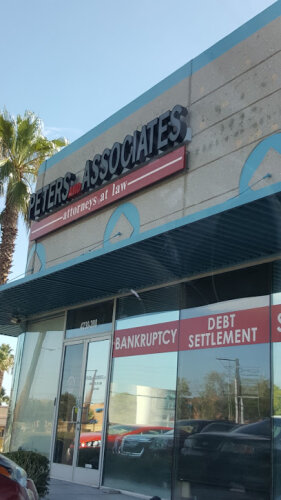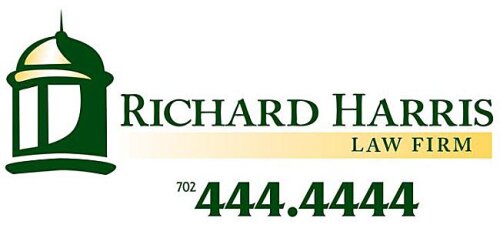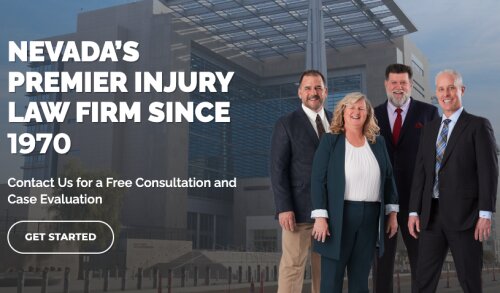Best Assault & Battery Lawyers in Las Vegas
Share your needs with us, get contacted by law firms.
Free. Takes 2 min.
List of the best lawyers in Las Vegas, United States
About Assault & Battery Law in Las Vegas, United States
Assault and battery are common criminal accusations that involve threats, attempts, or actual physical contact that is harmful or offensive. In Las Vegas, which follows Nevada state law and local ordinances in Clark County, charges can range from a misdemeanor for a simple, non-injurious incident to serious felonies when a weapon, substantial bodily injury, or protected class is involved. The local criminal process includes arrest, formal charging by prosecutors, arraignment, pretrial stages, and potentially trial or plea negotiations. Victims may also pursue civil claims for damages in addition to criminal prosecution.
Why You May Need a Lawyer
Assault and battery matters often have immediate and long-term consequences - jail or prison time, fines, probation, a permanent criminal record, loss of firearm rights, and effects on employment, housing, and child custody. You may need a lawyer if you are:
- Arrested or charged with assault or battery and need someone to protect your constitutional rights and guide you through the criminal process.
- Facing enhanced or felony charges because a weapon, severe injury, or protected victim is alleged.
- The subject of a protective order, restraining order, or related family court action that can affect custody or visitation.
- A victim seeking to navigate criminal reporting, obtain protective relief, or pursue a civil claim for medical bills, lost wages, or pain and suffering.
- Considering self-defense or another legal defense and need to build a factual, evidentiary strategy.
An experienced attorney can evaluate the evidence, challenge unlawful stops or arrests, negotiate reduced charges or diversion programs, represent you at hearings, and advise about collateral consequences like immigration or employment effects.
Local Laws Overview
Nevada law governs the elements that prosecutors must prove in assault and battery cases, while Las Vegas and Clark County enforce those laws through local law enforcement and the court system. Key points to understand include:
- Definitions - Assault generally refers to an act that creates a reasonable apprehension of imminent harmful or offensive contact. Battery refers to the actual unlawful touching or use of force against another person. Local practice may refer to combined or separate charges depending on the facts.
- Degree and enhancements - Charges can be misdemeanors or felonies depending on factors such as the severity of injury, use of a deadly weapon, whether the victim was a protected class (police officer, elderly person, child, teacher), or whether the incident occurred in certain locations. Aggravating factors increase the potential penalties.
- Domestic violence - Incidents between intimate partners or household members are often charged under special domestic-violence provisions. Domestic incidents may trigger mandatory arrest policies, enhanced penalties, and immediate civil remedies like temporary protective orders. Domestic convictions also have additional collateral effects - for example, potential restrictions on firearm possession.
- Criminal process in Clark County - Local law enforcement, including the Las Vegas Metropolitan Police Department, investigates allegations and may make arrests. Prosecutors in the Clark County District Attorney's Office decide whether to file charges and which charges to file. Misdemeanor matters may proceed in municipal or justice courts, while felony matters go to district court.
- Defenses and burden of proof - The state must prove guilt beyond a reasonable doubt. Common defenses include self-defense or defense of others, lack of intent, mistaken identity, consent in limited contexts, and constitutional issues like unlawful arrest or statements made without proper warnings.
- Diversion and specialty courts - Clark County offers diversion and specialty court programs for eligible defendants, such as domestic violence courts, mental health courts, veterans courts, and drug courts. These programs can provide alternatives to traditional prosecution and may result in reduced charges or dismissal when participants complete program requirements.
Frequently Asked Questions
What is the difference between assault and battery in Las Vegas?
Assault typically means creating the reasonable fear of immediate harmful or offensive contact, while battery means the actual unlawful touching or use of force against another person. Local prosecutors may charge one or both offenses depending on the specific facts.
Can an assault charge be a felony in Nevada?
Yes. Simple assault or battery often starts as a misdemeanor, but the charge can be elevated to a felony if factors like significant bodily injury, use of a deadly weapon, or victim status as a protected person are present.
What should I do if the police come to my door about an alleged assault?
Remain calm and polite. You are not required to answer incriminating questions - you may state that you want to speak with an attorney before answering. Avoid physically resisting law enforcement, and document the encounter later including names and badge numbers if possible.
Can I claim self-defense in an assault or battery case?
Self-defense is a common and valid defense when the defendant reasonably believed force was necessary to protect themselves or others from imminent harm. The reasonableness of the belief and proportionality of the response are critical factors.
Will I lose my right to own firearms if convicted of battery?
A conviction for certain violent offenses or domestic violence misdemeanors can lead to firearm restrictions under state and federal law. The exact consequence depends on the charge and conviction, so consult a lawyer immediately if firearms ownership is a concern.
What happens if the alleged victim does not want to press charges?
Prosecutors control criminal charges, not private victims. Even if a victim withdraws cooperation, prosecutors may still proceed if they believe there is sufficient evidence. However, victims who refuse to participate can affect the strength of the prosecution.
Can assault or battery charges be expunged or sealed in Nevada?
Options for sealing or expungement in Nevada are limited and depend on the offense, sentence, and other legal factors. Some diversion programs or first-time offender dispositions may allow for sealing, but this requires individualized legal advice and court filings.
Will an assault charge affect my immigration status?
Certain violent offenses can have serious immigration consequences, including deportation or inadmissibility. Noncitizens should consult an attorney experienced in both criminal and immigration law before accepting any plea or resolution.
What penalties could I face if convicted of battery in Las Vegas?
Penalties vary widely - from fines and short jail terms for simple misdemeanors to lengthy prison sentences for felonies involving serious injury or weapons. Convictions can also lead to probation, restitution, mandatory counseling, community service, and collateral consequences like employment or housing challenges.
Should I speak to the prosecutor on my own to try to resolve the case?
It is usually best to have an attorney handle communications with prosecutors. Attorneys know local practices, can present legal arguments, and negotiate from a position of experience. Speaking without counsel can risk making statements that harm your defense.
Additional Resources
- Local law enforcement - contact local police or sheriff for incident reports and information about investigations.
- Clark County District Attorney's Office - the office responsible for evaluating and prosecuting criminal charges in Clark County.
- Las Vegas Municipal Court, Justice Courts, and Clark County District Court - these courts handle arraignments and trials for misdemeanors and felonies.
- Victim services - local victim advocates and community organizations can help with safety planning, protective orders, and navigating the criminal justice system.
- Nevada Coalition to End Domestic and Sexual Violence - provides resources and referrals for survivors of domestic violence and sexual assault.
- Legal aid and bar referral services - nonprofit legal services and the state bar can help connect you to attorneys and low-cost legal help if you qualify.
- Public defender offices - if you cannot afford a private attorney and qualify financially, a public defender may be appointed to represent you in criminal proceedings.
Next Steps
If you are involved in an assault or battery matter - whether as a defendant, an alleged victim, or a concerned third party - consider the following steps:
- Prioritize safety. If you are at risk, seek a safe location and contact law enforcement or victim services.
- Seek medical attention if there are injuries and preserve medical records as evidence.
- Preserve evidence - photographs, messages, videos, witness contact information, and any physical evidence can be crucial.
- Exercise your right to remain silent when questioned by police until you can speak with an attorney.
- Contact an experienced criminal defense attorney or a victim advocate as soon as possible to discuss options, potential defenses, and next legal steps.
- Attend all court dates and comply with bail or release conditions to avoid additional charges.
- If you are a victim, ask about protective orders and victim services, and consider civil remedies for compensation if appropriate.
Every case is different. Early legal advice tailored to your facts and goals is the most reliable way to protect your rights and achieve the best possible outcome.
Lawzana helps you find the best lawyers and law firms in Las Vegas through a curated and pre-screened list of qualified legal professionals. Our platform offers rankings and detailed profiles of attorneys and law firms, allowing you to compare based on practice areas, including Assault & Battery, experience, and client feedback.
Each profile includes a description of the firm's areas of practice, client reviews, team members and partners, year of establishment, spoken languages, office locations, contact information, social media presence, and any published articles or resources. Most firms on our platform speak English and are experienced in both local and international legal matters.
Get a quote from top-rated law firms in Las Vegas, United States — quickly, securely, and without unnecessary hassle.
Disclaimer:
The information provided on this page is for general informational purposes only and does not constitute legal advice. While we strive to ensure the accuracy and relevance of the content, legal information may change over time, and interpretations of the law can vary. You should always consult with a qualified legal professional for advice specific to your situation.
We disclaim all liability for actions taken or not taken based on the content of this page. If you believe any information is incorrect or outdated, please contact us, and we will review and update it where appropriate.

















